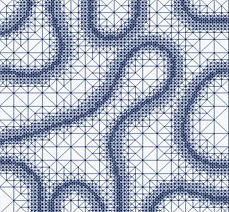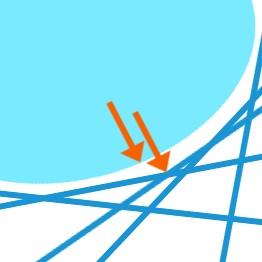Context
Many of the most challenging problems in the applied sciences involve non-differentiable structures as well as partial differential operators, thus leading to non-smooth distributed parameter systems. The non-smoothness considered in this DFG-Priority Program (DFG-PP) typically arises
- (i) directly in the problem formulation,
- (ii) through inequality constraints, nonlinear complementarity or switching systems, or
- (iii) as a result of competition and hierarchy.
In fact, very challenging applications for (i) come from frictional contact problems, or non-smooth constitutive laws associated with physical processes such as Bean’s critical state model for the magnetization of superconductors, which leads to a quasi-variational inequality (QVI) problem; for (ii) are related to non-penetration conditions in contact problems, variational inequality problems, or inequality constraints in optimization problems which, upon proper re-formulation lead to complementarity problems and further, by means of non-linear complementarity problem (NCP) functions, to non-smooth systems similar to (i); and for (iii) come from multi-objective control systems or leader-follower principles, as they can be found in optimal system design in robotics and biomechanics. Modelling ”competition” often leads to generalized Nash equilibrium problems (GNEPs) or partial differential games. Moreover, modelling ”hierarchy” results in mathematical programs with equilibrium constraints (MPECs), a class of optimization problems with degenerate, non-smooth constraints. All of these problems are highly nonlinear, lead to QVIs, and represent rather novel mathematical structures in applications based on partial differential operators. In these and related applications, the transition from smoothing or simulation-based approaches to genuinely non-smooth techniques or to multi-objective respectively hierarchical optimization is crucial.
Challenges
Fundamental difficulties in non-smooth partial differential systems, associated optimization and hierarchical problems are of analytical as well as algorithmical and numerical nature. For instance, for QVIs the existence and stability of solutions is a major challenge, whereas MPECs suffer from a lack of existence of Lagrange multipliers due to constraint degeneracy, which hinders the derivation of proper stationarity conditions. Numerical challenges, which are present in all non-smooth problems of this proposal, involve the stability of discretization/model reduction schemes or severe mesh dependence of algorithms. In order to overcome these difficulties, the goals of this DFG-PP are to advance tools from non-smooth and set-valued analysis and to build a basis for stable numerical approximation/discretization schemes that enable the design of algorithms with mesh independent convergence. The DFG-PP also aims to address the influence of parameters, which enter the above applied problems and which either range within a specified set or result from hierarchy. The former leads to robust optimization in form of deterministic MPECs, which challenge the characterization of stationary points and the development of efficient solvers. Hierarchical problems (or MPECs) contain variables which enter into lower level problems as parameters. Summarizing, the research program of the DFG-PP leads to a modern treatment of non-smooth problems and will therefore shape future applications in the field.
Goals of the SPP
Accordingly, the short and mid-term goals of the DFG-PP consist in establishing a theoretical and numerical foundation as well as in developing new algorithmic paradigms for the treatment of non-smooth phenomena and associated parameter influences. Long-term goals involve the realization and further advance of these concepts in the context of robust and hierarchical optimization, partial differential games, and nonlinear partial differential complementarity problems as well as the validation in the context of complex applications. This DFG-PP is motivated by important applications and very recent advances in theory and numerics for non-smooth distributed parameter systems (such as semi-smoothness in function space) and their optimization as well as the beginning of the blending of such non-smooth systems with problems requiring robust solutions. Rooted in applied mathematics, the DFG-PP has an interdisciplinary outreach as its results will benefit computational scientists and engineers, who face challenging applications involving non-smooth components. Structurally, on the one hand, the DFG-PP requires basic research in single projects, while for the synthesis and fostering of ideas and techniques the networking of research groups is needed. Moreover, clustering the research projects around prototypical applications is important to achieve landmark results and to succeed in addressing challenging applications.
Prototypical applications
The research program of SPP 1962 relies on motivating applications, which provide the mathematical problem structure for the analytical and numerical research questions considered in the short- and mid-term. The long-term goals of this program consist in obtaining analytical as well as numerical results for realistic scenarios related to these application areas. These applications include in particular:
- (i) Multi-physics problems,
- (ii) optimal system design in robotics and biomechanics and motion optimization, and
- (iii) multi-objective control systems.
Phase 1 of SPP 1962
The first phase of SPP 1962 ran from October 2016 to October 2019. More details can be found here.
Communicating Research Areas
-

Modeling, problem analysis, algorithm design and convergence analysis
The focus of this area is on the development and analysis of genuinely non-smooth models in the sciences in order to properly capture real-world effects and to avoid comprising smoothing approaches. In simulation and optimization this requires to advance set-valued analysis and the design of robust algorithms for non-smooth problems.
-

Realization of algorithms, adaptive discretization and model reduction
As the target applications of this SPP involve non-smooth structures and partial differential operators, the discretization of the associated problems and robust error estimation are important issues to be address, and proper model-reduction techniques need to be developed.
-

Incorporation of parameter dependencies and robustness
In many applications the robustness of solutions with respect to a given parameter range (uncertainty set) is highly relevant. Correspondingly, in this research area of the SPP, bi- or multilevel optimization approaches will be studied in order to robustify problem solutions against uncertain parameters.
Coordination
Prof. Dr. Michael Hintermüller
HU Berlin / WIAS Berlin
michael.hintermueller[at]wias-berlin.de
webpage at HU Berlin
Steering Committee
-
Prof. Dr. Matthias
Heinkenschloss
Rice University -
Prof. Dr. Roland Herzog
Technische Universität Chemnitz -
Prof. Dr. Michael Hintermüller
Humboldt-Universität zu Berlin/ WIAS Berlin -
Prof. Dr. Barbara Kaltenbacher
Alpen-Adria-Universität Klagenfurt -
Prof. Dr. Michael Ulbrich
Technische Universität München
OPTPDE Problem database
A set of benchmark problems in optimization with PDEs
Contact editors (at) optpde.net to include your own contributions.

